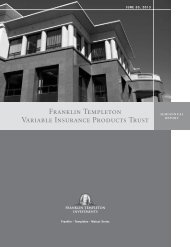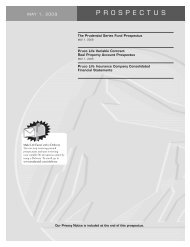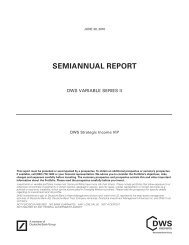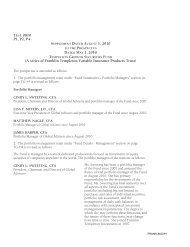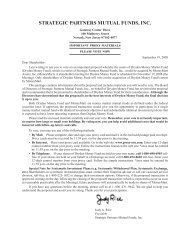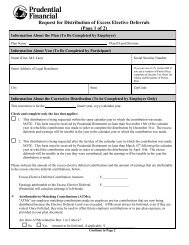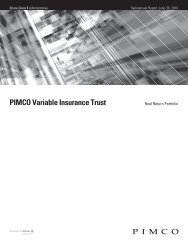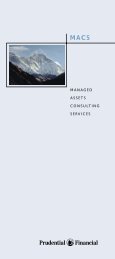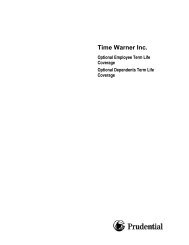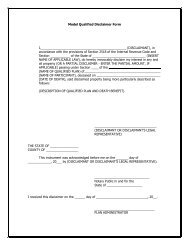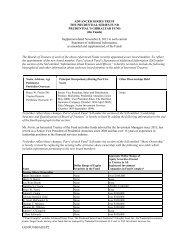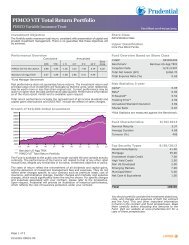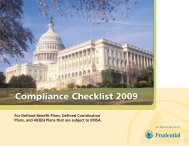The Prudential Series Fund
The Prudential Series Fund
The Prudential Series Fund
Create successful ePaper yourself
Turn your PDF publications into a flip-book with our unique Google optimized e-Paper software.
HOW TO BUY AND SELL SHARES OF THE PORTFOLIOS<br />
PURCHASING SHARES OF THE PORTFOLIOS<br />
<strong>The</strong> <strong>Fund</strong> offers two classes of shares in each Portfolio — Class I and Class II. Each Class participates in the same investments within a<br />
given Portfolio, but the Classes differ as far as their charges. Class I shares are sold only to separate accounts of <strong>Prudential</strong> as<br />
investment options under certain variable annuity and variable life insurance Contracts. Class II is offered only to separate accounts<br />
of non-<strong>Prudential</strong> insurance companies as investment options under certain of their Contracts. Please refer to the accompanying<br />
Contract prospectus to see which Portfolios are available through your Contract.<br />
<strong>The</strong> way to invest in the Portfolios is through certain variable life insurance and variable annuity contracts. Together with this<br />
prospectus, you should have received a prospectus for such a Contract. You should refer to that prospectus for further information on<br />
investing in the Portfolios. Both Class I and Class II shares of a Portfolio are sold without any sales charge at the net asset value of the<br />
Portfolio. Class II shares, however, are subject to an annual distribution or “12b-1” fee of 0.25% of the average daily net assets of<br />
Class II.<br />
Under the distribution plan adopted by the <strong>Fund</strong> for Class II shares, Class II of each Portfolio pays to <strong>Prudential</strong> Investment<br />
Management Services LLC (PIMS) a distribution or 12b-1 fee at the annual rate of 0.25% of the average daily net assets of Class II.<br />
This fee pays for distribution services for Class II shares. Because these fees are paid out of the Portfolio’s assets on an ongoing basis,<br />
over time these fees will increase the cost of your investment in Class II shares and may cost you more than paying other types of<br />
sales charges. Class II shares are also subject to an administration fee of 0.15% of the average daily net assets of Class II. Class I<br />
shares do not have a distribution or administration fee.<br />
Shares are redeemed for cash within seven days of receipt of a proper notice of redemption or sooner if required by law. <strong>The</strong>re is no<br />
redemption charge. We may suspend the right to redeem shares or receive payment when the New York Stock Exchange (NYSE) is<br />
closed (other than weekends or holidays), when trading on the NYSE is restricted, or as permitted by the SEC.<br />
FREQUENT PURCHASES OR REDEMPTIONS OF PORTFOLIO SHARES<br />
<strong>The</strong> <strong>Fund</strong> is part of the group of investment companies advised by PI that seeks to prevent patterns of frequent purchases and<br />
redemptions of shares by its investors (the “PI funds”). Frequent purchases and redemptions may adversely affect the investment<br />
performance and interests of long-term investors in the Portfolios. When an investor engages in frequent or short-term trading, the PI<br />
funds may have to sell portfolio securities to have the cash necessary to pay the redemption amounts. This may cause the PI funds to<br />
sell Portfolio securities at inopportune times, hurting their investment performance. When large dollar amounts are involved, frequent<br />
trading can also make it difficult for the PI funds to use long-term investment strategies because they cannot predict how much cash<br />
they will have to invest. In addition, if a PI fund is forced to liquidate investments due to short-term trading activity, it may incur<br />
increased transaction and tax costs.<br />
Similarly, the PI funds may bear increased administrative costs as a result of the asset level and investment volatility that accompanies<br />
patterns of short-term trading. Moreover, frequent or short-term trading by certain investors may cause dilution in the value of PI fund<br />
shares held by other investors. PI funds that invest in foreign securities may be particularly susceptible to frequent trading, because<br />
time zone differences among international stock markets can allow an investor engaging in short-term trading to exploit fund share<br />
prices that may be based on closing prices of foreign securities established some time before the fund calculates its own share price.<br />
PI funds that invest in certain fixed income securities, such as high-yield bonds or certain asset-backed securities, may also constitute<br />
effective vehicles for an investor’s frequent trading strategies.<br />
<strong>The</strong> Boards of Trustees of the PI funds, including the <strong>Fund</strong>, have adopted policies and procedures designed to discourage or prevent<br />
frequent trading by investors. <strong>The</strong> policies and procedures for the <strong>Fund</strong> are limited, however, because the <strong>Fund</strong> does not directly sell<br />
its shares directly to the public. Instead, Portfolio shares are sold only to insurance company separate accounts that fund variable<br />
annuity contracts and variable life insurance policies (together, the “contracts”). <strong>The</strong>refore, the insurance companies purchasing<br />
Portfolio shares (the “participating insurance companies”), not the <strong>Fund</strong>, maintain the individual contract owner account records.<br />
Each participating insurance company submits to the <strong>Fund</strong>’s transfer agent daily aggregate orders combining the transactions of many<br />
contract owners. <strong>The</strong>refore, the <strong>Fund</strong> and its transfer agent do not monitor trading by individual contract owners.<br />
Under the <strong>Fund</strong>’s policies and procedures, the <strong>Fund</strong> has notified each participating insurance company that the <strong>Fund</strong> expects the<br />
insurance company to impose restrictions on transfers by contract owners. <strong>The</strong> current participating insurance companies include<br />
<strong>Prudential</strong> and insurance companies not affiliated with <strong>Prudential</strong>. <strong>The</strong> <strong>Fund</strong> may add additional participating insurance companies<br />
in the future. <strong>The</strong> <strong>Fund</strong> receives reports on the trading restrictions imposed by <strong>Prudential</strong> on variable contract owners investing in the<br />
Portfolios, and the <strong>Fund</strong> monitors the aggregate cash flows received from unaffiliated insurance companies. In addition, the <strong>Fund</strong> has<br />
entered shareholder information agreements with participating insurance companies as required by Rule 22c-2 under the Investment<br />
64



